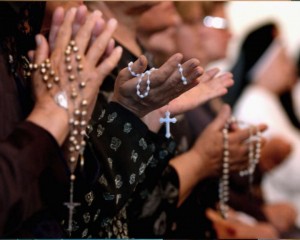Iraq: “We Fear a Civil War”
 “We fear a civil war. If the various different opposing internal parties do not succeed in finding an agreement, then we must expect the worst. Another war would mean the end, especially for us Christians.”
“We fear a civil war. If the various different opposing internal parties do not succeed in finding an agreement, then we must expect the worst. Another war would mean the end, especially for us Christians.”
This was the message from Chaldean Auxiliary Bishop Saad Syroub of Baghdad, speaking to Catholic charity Aid to the Church in Need (ACN) from the Iraqi capital.
According to Bishop Syroub, the present crisis in Iraq is a direct consequence of the war of 2003 and of the inefficiency of the new democratic system “which cannot function if there is no true reconciliation.”
For this reason, rather than an external military intervention, the bishops would prefer to see greater pressure applied by the international community, and by the United States in particular, to persuade the various internal factions within the country to reach an accord.
“More than a week has passed since the invasion of Mosul by the Islamic State of Iraq and the Levant (ISIS) and still there is no common political plan.”
“Only an Iraq based on consent and reconciliation within can react to external dangers. Shi’ites and Sunnis have to understand that nothing will be resolved by violence.”
Bishop Syroub returned to Baghdad just this morning from a foreign trip, which he interrupted “in order to be close to my community at such a difficult time.”
He described the situation in the capital as abnormally quiet. There are not many cars or people in the streets, even though it is a working weekday.
“Everyone is afraid and people prefer to stay at home”, he told ACN, “while others have left the city.”
According to unconfirmed rumors, reported to ACN by the bishop, some of the northern suburbs of Baghdad may already be in the hands of the ISIS militia, who it is suggested may have imposed a curfew and be preventing the inhabitants from traveling to other areas of the city.
Meanwhile, for the past five days the government has blocked access to various internet sites, including the main e-mail servers and all the social networks, thereby “preventing us from communicating with the outside world.”
The Christians are “terrorized and deeply distressed” and many of them are asking for their baptismal certificates, so that they can leave the capital.
“After more than 2,000 years during which we have withstood obstacles and persecutions, Iraq is today almost emptied of its Christian presence,” says Bishop Syroub.
“Our young people are abandoning the country, and we can do nothing about it.”
“Besides, what reason can we possibly give them for staying? How can we protect them and assure them that the future will be better?”

